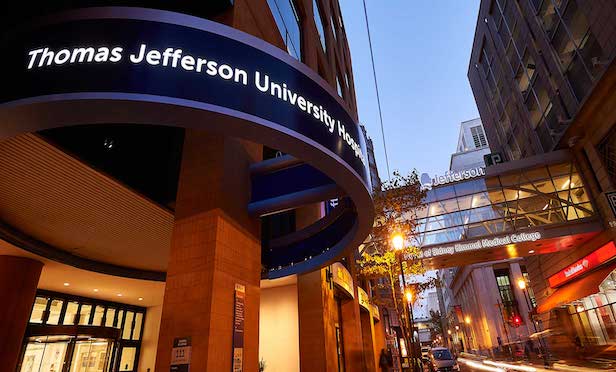 Thomas Jefferson University Hospital, Philadelphia
Thomas Jefferson University Hospital, Philadelphia
PHILADELPHIA—The Federal Trade Commission has joined the Commonwealth of Pennsylvania in seeking to block the proposed merger of Philadelphia's two major health care providers— Jefferson Health and Albert Einstein Healthcare Network.
The FTC reported on Thursday it had filed administrative complaint alleging that the proposed merger would reduce competition in both Philadelphia and Montgomery counties. The FTC also stated that it would seek a temporary restraining order and a preliminary injunction to prevent Jefferson Health and Albert Einstein Healthcare Network from completing the merger. The FTC, jointly with the Pennsylvania Attorney General, stated it would file a complaint in federal district court against the merger deal.
According to the complaint, Jefferson and Einstein have a history of competing against each other to improve quality and service, including by upgrading medical facilities and investing in new technologies. The proposed merger would eliminate the robust competition between Jefferson and Einstein for inclusion in health insurance companies' hospital networks to the detriment of patients, the FTC charges.
"Patients in the Philadelphia region have benefitted enormously from the competition between the Jefferson and Einstein systems," says Ian Conner, Director of the FTC's Bureau of Competition. "This merger would eliminate the competitive pressure that has driven quality improvements and lowered rates. Throughout our investigation, we have benefited from close cooperation with our partners in the Office of the Attorney General of Pennsylvania."
The FTC complaint alleges that, as a result of the merger, the parties would control at least 60% of the inpatient GAC hospital services market in and around North Philadelphia, and at least 45% of that market in and around Montgomery County.
The FTC vote to issue the administrative complaint and to authorize staff to seek a temporary restraining order and preliminary injunction was 4-0-1, with Chairman Joseph J. Simons recused. The administrative trial is scheduled to begin on Sept. 1, 2020. The federal court complaint and request for preliminary relief was to be filed in the U.S. District Court for the Eastern District of Pennsylvania.
The FTC and Pennsylvania Attorney General's actions were met with criticism from US Rep. Dwight Evans (D-PA-3rd) and Pennsylvania State Senator Christine M. Tartaglione (D-Philadelphia).
Congressman Evans stated, "This is an outrageous action by the Federal Trade Commission and Pennsylvania Attorney General's Office. The proposed merger would provide enhanced stability and access to high-quality care for the residents of North Philadelphia for the foreseeable future. I urge these agencies to drop this ill-considered action at once!"
Sen. Tartaglione said in a prepared statement: "The merger of Jefferson Health and Einstein Healthcare Network would provide the residents of North Philadelphia and the surrounding region with improved access to high-quality, reliable medical care, so I am extremely disappointed that the FTC has chosen to challenge this definitive agreement. As a safety net hospital within a largely underserved community, Einstein has long been committed to securing the resources needed to deliver essential medical care to families in need. The merger with Jefferson would advance that noble mission and support community health for the foreseeable future."
Officials with Jefferson Health and Albert Einstein Healthcare Network first announced their intent to merge back in March 2018. At the time, the two healthcare networks signed a Letter of Intent for the merger deal and stated the proposed transaction would bring together "two historically linked academic medical centers whose shared vision is to improve the lives of patients and their communities."
© Touchpoint Markets, All Rights Reserved. Request academic re-use from www.copyright.com. All other uses, submit a request to [email protected]. For more inforrmation visit Asset & Logo Licensing.







